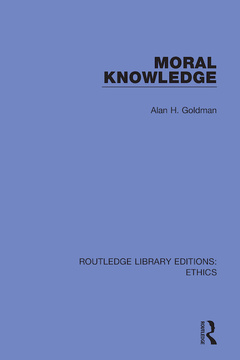Moral Knowledge Routledge Library Editions: Ethics Series
Auteur : Goldman Alan H.

Originally published in 1988, this book discusses if moral knowledge exists, and if so, if it is similar to other forms of knowledge. This book approaches the issues from both historical and contemporary perspectives and in order to determine whether there is a real property of rightness, looks to the ethical theories of Hobbes, Hume and Kant. This historical analysis leads to a systematic comparison of three theories of the nature of ethics: realism, emotivism and coherentism. The nature of coherence is explained using legal reasoning as a model. Moral reasoning is compared and contrasted with reasoning both in science and law, showing how ethics differs from science and empirical disciplines.
Introduction A: Knowledge B: Moral Knowledge C: Some Distinctions among Questions and Answers 1. Hobbes: Subjective Realism and Prudential Rationality 2. Hume: Subjectivism, Relational Properties and Utility 3. Kant: Objective Rationality and Obligation 4. Realism, Emotivism, Coherentism 5. Coherence, Moral Reasoning and Knowledge.
Date de parution : 06-2022
15.6x23.4 cm
Disponible chez l'éditeur (délai d'approvisionnement : 14 jours).
Prix indicatif 37,68 €
Ajouter au panierDate de parution : 07-2020
15.6x23.4 cm
Disponible chez l'éditeur (délai d'approvisionnement : 14 jours).
Prix indicatif 123,78 €
Ajouter au panierThèmes de Moral Knowledge :
Mots-clés :
Real Moral Properties; existence moral knowledge; Moral Knowledge; coherence theory; Non-moral Properties; Hobbes; Hume; Kant; Rational Evaluators; moral reasoning in science and law; Moral Properties; ethics; Generalization Constraint; coherentism; Non-moral Facts; emotivism; Objective Moral Properties; Moral Beliefs; realism; Moral Frameworks; ethical theories of Hobbes; Moral Judgments; Moore’s Open Question Argument; Kant’s Test; Token Identity Theory; Prudential Rationality; Morally Relevant; Normal Perceivers; Paternalistic Interference; Non-realist Account; Gettier Cases; Good Life; Meta-ethical Theories; Secondary Qualities; Occurrent Mental States; Rational Agents



